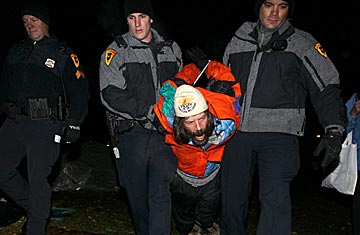
An Occupy Salt Lake City activist is carried out of the protest's encampment after being arrested by police for refusing to leave, Saturday, Nov. 12, 2011, in Salt Lake City.
The protesters had occupied Pioneer Park in Salt Lake City since Oct. 6, the local manifestation of the Occupy movement in capital of Utah. At the height of the agitation, there were approximately 150 individuals residing in the camp, which was equipped with a stocked kitchen, a free school, a community newsletter and a night watch committee. It hadn't been trouble free: there had been some minor confrontations early on between the homeless community that has frequented the park for over two decades and Occupy protestors; and police made 91 drug and alcohol related arrests. And, on Thursday, Nov. 10, four individuals were arrested following another fight that broke out in the park between Occupy protestors and the homeless population.
Neverthless, the confrontations between the protesters, on one side, and the police and the mayor's office, on the other, were nothing at all approaching what occurred in New York City or, certainly, Oakland, California. Then, a homeless man was found dead in his tent Friday morning shortly after 10 a.m. Although the official cause of death is still unknown, Salt Lake City Police Chief Chris Burbank said it was likely a combination of drug overdose and carbon monoxide poisoning. Police officers had found a propane heater and drug paraphernalia in the tent. That seemed to have prompted the police to act.
On Saturday evening Burbank kept two of his promises: Pioneer Park would be cleared and it would be done peacefully. Eighteen protesters were arrested and one was issued a citation through the course of the sweep — but no violence erupted, despite protesters chanting "This is why we call you pigs!" and "This is what a police state looks like!" as officers disassembled the camp. Prior to police arriving, Occupy residents had coached each other on strategies of how to respond to the eviction with non-violent direct action. Meanwhile two stretch hummer limousines arrived at the scene to help transport the belongings of the protesters and allied homeless people into storage and take them to shelters or to join the Occupy Ogden movement 40 miles north.
The police chief tried to be as conciliatory as possible. "We will work with you to find avenues that you can express you're free speech — it just can't be done by camping on our streets or in our park. The risk to even one individual is far too great, but the risk to many is significant," Burbank told a crowd of protesters on Friday afternoon. The organizers of the protest say they plan to continue occupying, despite camping being outlawed at the site. The day after being evicted protestors marched through the streets of downtown and say they have plans to meet with City Council members. On Saturday, Jesse Fruhwirth, one of the major organizers behind Occupy Salt Lake, stood in front of his tent holding a sign that read "Mayor [Ralph] Becker this is what tyranny looks like" as police officers began dissembling his tent.
At least one local politician felt that clearing the camp was unnecessary. City Councilman Soren Simonsen said that it didn't seem to look like the death was directly linked to the Occupy movement, even though the encampment seemed to enable it. "I understand the concerns that the police department has. My personal opinion was that [the eviction] was a bit heavy handed and perhaps a bit rushed," Simonsen said. Occupy protester Tara Robbins said that she felt the city had used the death to scapegoat the movement. "We know from many sources that he was homeless and he was around the age range when many homeless people pass away on the streets. There were 54 deaths on the streets in 2010 and the year before there were 58," Robbins said. She also noted that the group had received conflicting information."
Fruhwirth was arrested along with activists Michael Wilson and Rachel Carter after the three began re-pitching a tent that police officers had broken down earlier in the evening. The dwindling crowd of protesters chanted "Thank you, Jesse! Thank you, Michael! Thank you, Rachel!" as the three were led to the waiting fleet of police vans that had filled the block of 400 South. All 18 protesters arrested during the sweep were released by 2 a.m. on Sunday morning.
Robbins agreed that the police did a good job making sure that protesters were dealt with in a non-violent manner and were asked if they wanted to be arrested, but called their presence overwhelming. "The way that the actual cleanup was done I think was beyond ridiculous. They had bulldozers and front loaders and we saw bicycles and tents falling from this big equipment. I think they wasted resources in doing that." Although the city has outlawed overnight camping in Pioneer Park, day-use tents will still be allowed and the group intends to maintain a daytime presence. Robbins said the group was still working on creating a plan for what to do next, but did mention that they will be meeting with City Council members next Tuesday. Although not everyone on City Council may support the group, it seems they have an ally in Sorensen. "I'm working with Becker and the administration to try and ensure that we can re-establish an around-the-clock-presence," City Councilmen Sorensen said. "For me this is a really important cause [that] I find an affinity with."
